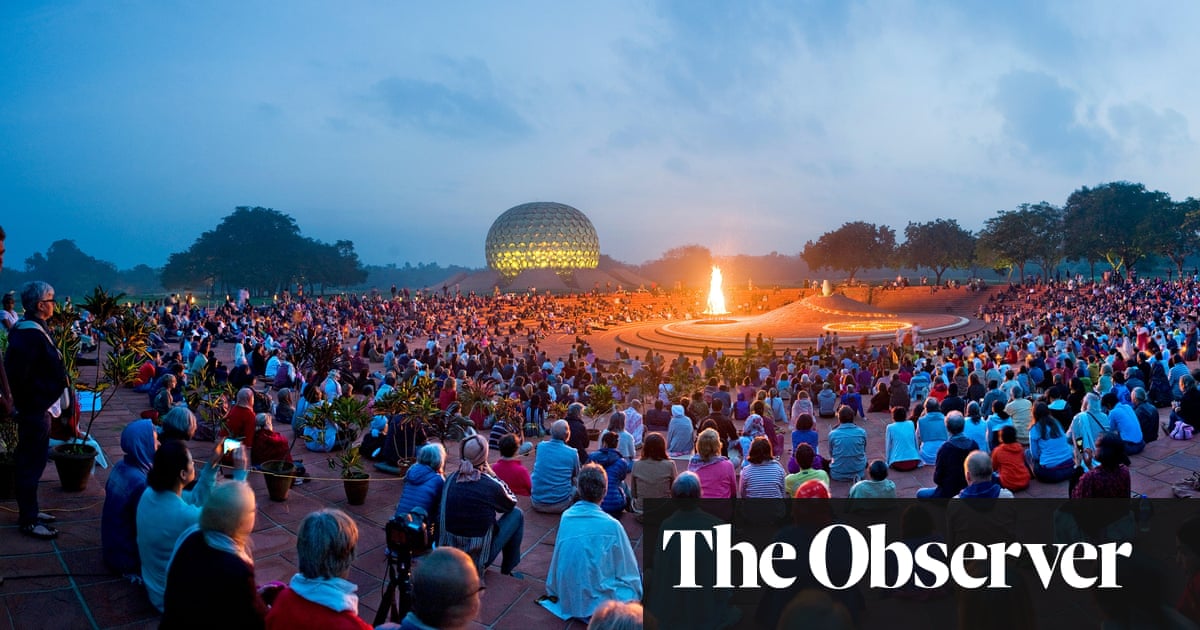Bulldozers, violence and politics crack an Indian dream of utopia - 4 minutes read

Nestled deep in the south Indian state of Tamil Nadu, cocooned from the world by a young forest, lies a community that wants to change the world. Ask the residents, of Auroville, who come from more than 60 countries, what they are doing there and the answer will be much the same as it has been for more than five decades: “The purpose of Auroville is to realise human unity.”
Tensions came to a head last month, when JCBs rolled into Auroville’s forests to begin a controversial development that has created a schism unlike anything seen before in this peace-loving community. Dozens of residents threw themselves in front of the bulldozers, while others backed the demolitions. A case against the project is now being heard by India’s highest environmental court.
The rupture is being blamed by many on an “outsider”. Since 1988, although the Indian government has had jurisdiction over Auroville, the community has been largely left to its own devices. But in July, Jayanti Ravi, a civil servant, arrived as the new secretary of the Auroville Foundation and immediately began enacting the polarising agenda of development.
Ravi’s actions have sent the community into a tailspin; some feel she is giving Auroville the push it needs after years of stasis and dysfunction, others say she is riding roughshod over democratic community processes, and that her agenda is pulling the community apart at the seams.
In recent years, there has been a renewed interest in Sri Aurobindo, Auroville’s founding guru, by India’s ruling Hindu nationalist Bharatiya Janata Party (BJP). Though Aurobindo’s teachings explicitly spoke against the communal politics that have become commonplace under the BJP, there has been a marked attempt by its leaders to champion Aurobindo as an early proponent of the Hindutva ideology, which believes India should be a Hindu rather than secular state. Modi paid a visit to Auroville in 2018.
After Sri Aurobindo’s death, Alfassa inaugurated Auroville in 1968 on a barren piece of land a few miles from the ashram. Working with the French architect Roger Anger, Alfassa created the Galaxy Plan, a vision of how a perfect city should be built, designed along a layout of “sacred geometry”. She wanted Auroville to be a “city for humanity” home to 50,000 people, with 75% reserved as a green belt for farming and forest. This was later translated into an official masterplan, which was approved by Auroville residents and the Indian government.
But in recent decades the city plans have been at a standstill, to the frustration of many. “Nothing has moved because for years we have been stuck between two factions,” said Gijs Spoor, a resident. On one side of the divide are residents who believe Auroville will succeed only if it is built exactly as envisaged in the masterplan, and that any revisions of the sacred geometry, or further delays, would obstruct the Mother’s “forward-thinking vision”.
“This masterplan is more futuristic than we can even imagine, but unless we can build it, what are we here for?” said Anu Majumdar, who has lived in Auroville since 1979. “Trees alone will not solve all the problems of humanity. We are currently 3,200 people living on 3,300 acres of land, which is not sustainable. We need to build the city for 50,000.”
“We are not anti-development, we are just pro-development in a way that really respects nature, respects the environment, the water, the millions of trees we have planted that are going to decide our survival on this land,” said Prieto, who was raised in Auroville. “To refuse to adapt the masterplan because it would be ‘blocking the Mother’s dream’ smacks of spiritual authoritarianism,” she added. “I don’t think it was the Mother’s dream to destroy the living environment around us.”
It was into this impasse that Ravi arrived. Along with a new foundation governing board, also government appointed, a decision was made to begin building the masterplan immediately, starting with a circular road known as The Crown. They also applied for 10bn rupees (£9m) in government grants. “This place is something very beautiful that India has so magnanimously offered and we can not have decadence and stagnation any longer,” said Ravi. “The masterplan was already agreed by residents; it’s my mandate to implement it.”
Some residents filed a case against the Auroville Foundation to the Green Tribunal, India’s highest environmental court, which led to an interim halt on all tree felling. And after a petition was signed by more than 500 residents, a request for the development to be put on hold is being debated by the residents’ assembly, a process expected to take more than a month.
Source: The Guardian
Powered by NewsAPI.org